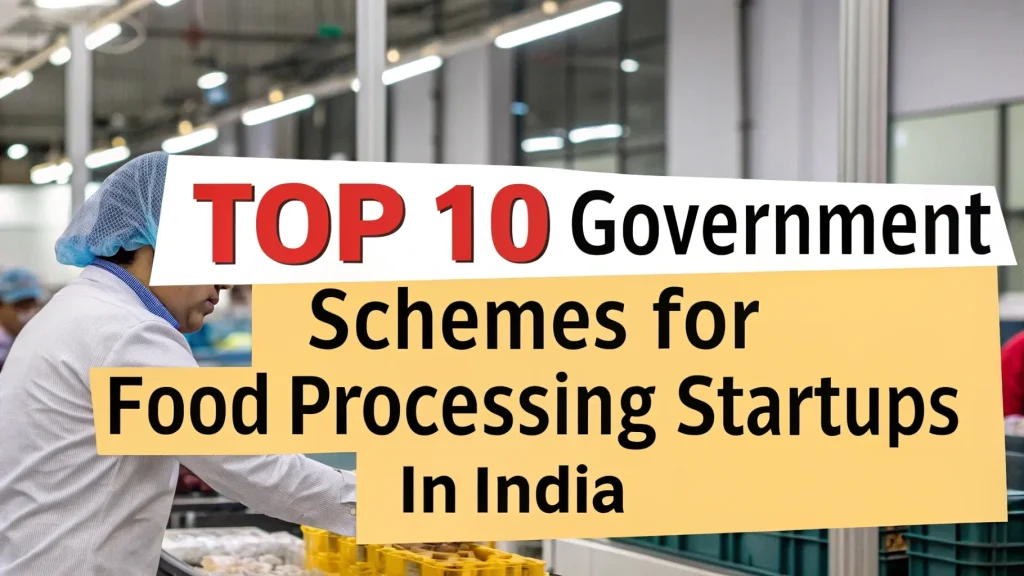The food processing business in India is becoming one of the most exciting areas for new businesses. This is due to increasing urbanization, disposable income, and a greater need for packaged and nutritious food products. By 2023–24, the sector was responsible for 7.66% of the gross value added in manufacturing and 8.45% in the agriculture sector, averaging 5.35% growth yearly over the past eight years (MoFPI Annual Report, 2023-24). In order to sustain this growth trajectory, the Indian government has recently offered various policies and subsidies specifically aimed at food processing startups.
Here are the top 10 government schemes that aspiring entrepreneurs in this sector should explore in 2025:
1. Pradhan Mantri Kisan Sampada Yojana (PMKSY)
Launched by: Ministry of Food Processing Industries (MoFPI)
Objective: PMKSY seeks to establish modern infrastructure along with efficient supply chain management from the farm gate to the retail outlet.
Components Include:
- Mega Food Parks
- Integrated Cold Chain and Value Addition Infrastructure
- Creation/Expansion of Food Processing & Preservation Capacities (CEFPPC)
- Agro Processing Clusters
- Operation Greens
Highlights:
- Financial support ranging from 35% to 75% of the project cost
- Over 41 Mega Food Parks and more than 800 projects approved under various sub-schemes
- Annual Budget Allocation (2023-24): Approx. ₹1,500 crores
2. PM Formalization of Micro Food Processing Enterprises (PMFME) Scheme
Objective: Foster formalization and enhance competitiveness for unorganized micro food processing units.
Key Features:
- One District One Product (ODOP) Model
- Credit-linked capital subsidy @35% up to ₹10 lakh per unit
- Support for FPOs/SHGs/cooperatives and training programs
- Budget Outlay: ₹10,000 crores till 2025-26
Online Portal: https://pmfme.mofpi.gov.in
Related: Pradhan Mantri Formalisation of Micro Food Processing Enterprises (PMFME) Scheme
3. Production Linked Incentive (PLI) Scheme for Food Processing
Objective: Stimulate significant investment in food processing to enhance manufacturing and exports.
Focus Areas:
- Ready to cook/ready to eat foods
- Marine products, fruits, and vegetables
- Other innovative and organic products by small and medium enterprises (SMEs)
Incentive Range: 4% to 10% of incremental sales (over base year) for 6 years
Total Outlay: ₹10,900 crores
Portal: https://plimofpi.ifciltd.com
4. Mega Food Parks Scheme
Goal: Integrate agricultural production with marketing by connecting farmers, processors, and retailers.
Incentives:
- Funding of up to ₹50 crore per park
- Includes land development, common processing centers, and logistic support for the park’s infrastructure.
Status: Out of the 41 parks that are approved throughout India, 22 are expected to be operational by 2024.
5. Cold Chain Infrastructure Scheme
Objective: To reduce cold chain and preservation post-harvest losses by integrating infrastructure.
Assistance:
- Provides grants of 35%-50% of the project’s cost.
- Pack houses, reefer vans, and ripening chambers are included.
Approved Projects: More than 350 projects across various states.
6. Agro Processing Cluster Scheme
Purpose: To stimulate food processing business by developing cluster-based infrastructure for entrepreneurial activities.
Funding:
- Funding provides 35-50% of project cost up to a maximum of ₹10 crore per unit.
- Includes common facilities such as processing units and training centers.
Focus: Rural and semi-urban areas with availability of agri-products.
7. Operation Greens
Scope: Initially introduced for the three staples tomato, onion, and potato (TOP); now extended to all perishable fruits and vegetables.
Features:
- Transport and storage subsidy of 50% for notified crops.
- Grants for the development of processing units and other infrastructure projects.
Impact: Reduction in price fluctuations as well as waste.
Total Approved Projects (2023-24): 98
8. Food Testing Laboratories: Infrastructure
Purpose: Ensure the food products safety and quality through scientific methods of testing.
Support:
- A Capital grant of 70% for general areas and 90% for NE and hilly states.
- Grant for equipment, civil works, and NABL accreditation.
Approved Labs: More than 100 laboratories assisted
9. NABARD Special Fund for Food Processing Units
Initiative by: NABARD and MoFPI
Objective: Creating affordable credit for food parks and agro-processing units.
Fund Size: ₹2,000 crore
Target Group: Units set up in Mega Food Parks and Designated Food Parks.
Features:
- Low interest rate
- Long repayment period
Related: Launch Your Profitable Food Processing Business
10. Nivesh Bandhu Portal and Investment Promotion
Platform: Investment support portal maintained by MoFPI as a one stop-window for all investment related support.
Offers:
- Guides for investment
- Policies of the respective states
- Databases of raw materials and project assistance
Growth and Market Potential of Food Processing Business Sector
FPI GVA Growth Rate: 1.29% (2022-23)
Employment: 71.79 lakh (both registered and unregistered units)
Exports: 46.4 billion dollars (11.7% of India’s total exports)
FDI Inflows: 6.8 billion dollars (2014-2024)
Table 1: Contribution of FPI to Manufacturing & Agriculture
| Sector | % Share (2022-23) |
| FPI in Manufacturing GVA | 7.66% |
| Agriculture GVA FPI | 8.45% |
Feeding India: Chart 1 India Food Export Growth ($35B to $46.4B)
Summary
Growth in the food processing Business is expected in 2025; this is due to certain policies and infrastructure frameworks put in place. Entrepreneurs able to offset risk and scale in a competitive landscape can utilize these top 10 government schemes which provide funding.
Niir Project Consultancy Services (NPCS)
NPCS prepares detailed reports analyzing the market and estimating techno economic feasibility for a specific industry or product. Their critical insights offered include the manufacturing processes, raw materials needed, plant layout, and financial modeling. With action-oriented data, NPCS assists entrepreneurs in evaluating the viability of establishing new industries or businesses.

